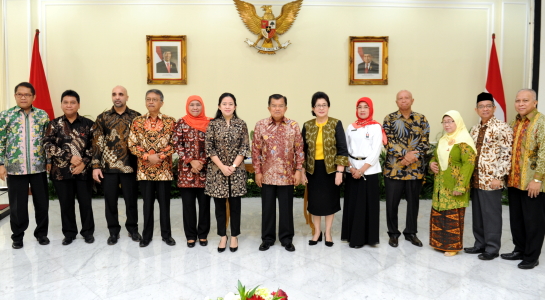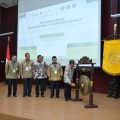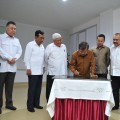Jakarta-wapresri.go.id Tuberculosis remains one of the top ten deadliest diseases in the world, including in Indonesia, even more dangerous than HIV/AIDS. To deal with this, it takes an active role of all parties to improve the environment.
Vice President Jusuf Kalla stated this at the launch of the Partnership in Combating Tuberculosis in Indonesia in 2017 held at the Vice Presidential Palace on Jalan Merdeka Selatan, Jakarta on Wednesday (March 15).
The Vice President further said, the environment plays an important role in the spread of the disease.
“In fact, any diseases come from a poor-quality environment,” he said.
Other than the environment, the Vice President argued, there are three other key elements in facing health issues, namely genetic factor, lifestyle, and treatment.
“Sometimes, we only think that it is the hospital that is responsible to deal with diseases including TB. Yet in fact, unhealthy habits, such as smoking and irregular exercise also play a role (in causing diseases),” he said.
According to him, government has made various efforts to tackle TB since long ago.
“In the past, we even had sanatoriums for tuberculosis patients to get good and clean air,” he said.
The Vice President then appreciated the Indonesian Stop-TB Partnership Forum (FSTPI) that has supported the government in fighting against TB in the country where the number of TB patients is the second largest in the world after India.
“When we improve the environment and provide treatment to people with TB, we actually help ourselves as we indirectly help prevent and avoid our families from the disease,” he added.
Concluding his speech, the Vice President re-emphasized that people should have healthy lifestyle and participate in creating clean environment in an effort to prevent TB.
Previously, FSTPI chairman Arifin Panigoro in a press release stated that Indonesia is one of 30 countries with a high burden of TB disease. Based on data from the World Health Organization (WHO), in 2015 the number of new TB cases reached 395 people per 100,000 population.
“We estimate that in Indonesia there are currently 395 new TB cases per 100,000 population per year, with 40 deaths due to TB per 100,000 population. If the number of Indonesia’s population is 250 million people, in one year there will be 1 million new TB cases with as many as 100,000 deaths due to this disease,” said Arifin.
At the end of the ceremony, a commitment of cooperation to TB control in Indonesia was signed among the Home Ministry, Ministry of Social Affairs, Ministry of Health, Ministry of Labor, Nahdlatul Ulama (the largest Islamic organization in Indonesia), Aisyiyah (women division of Muhammadiyah, second largest Islamic organization in the country), the Indonesian Employers Association, a representative of business sectors (Johnson and Johnson), a representative of health services (Indonesian Hospital Association), and the Indonesian Stop-TB Forum Partnership.
Also attending the event were the Coordinating Minister for Human Development and Culture Puan Maharani, Health Minister Nila F. Moeloek, Minister of Social Affairs Khofifah Indar Parawansa, and Minister of Communication and Informatics Rudiantara.







